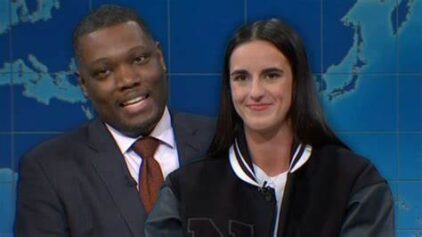It’s difficult for most to fathom if they didn’t experience the moment in real time, but Eddie Murphy was by far one of the biggest and most influential comedians and actors in the history of film in the 1980’s. This day, 30 years ago, was one of the most highly anticipated ever in cinema, as audiences yearned for yet some more of Murphy’s magic with the release of his latest film, Beverly Hills Cop II.
Murphy’s star catapulted off of the small screen after revitalizing the Saturday Night Live television franchise that had gone stale prior to his arrival. He singlehandedly made every episode a must-see event in the early ’80s and his influence on the pop culture landscape of the day was monumental.
To this day, I’ll greet my buddies that I grew up with in Brooklyn with, “I’m Gumby, dammit!” And they’ll swiftly reply with, “And don’t forget it!!!”
Ask anyone who was an avid fan of the show at that time, “Where were you when Buckwheat got shot?” And be prepared for the smile that ensues when they say, “Hey Mr. Wheat? Yeath.”
If in search of a true Eddie Murphy fan from back in the day, you’ll find them if they can sing “Wookin’ Pa Nub“, or if they can recite America’s most popular poem of the early ’80s, a searing piece called Images which was penned by Tyrone Greene.
Dark and lonely on the summer night.
Kill my landlord, kill my landlord.
Watchdog barking – Do he bite?
Kill my landlord, kill my landlord.
Slip in his window, Break his neck! Then his house I start to wreck! Got no reason — What the heck!
Kill my landlord, kill my landlord.
C-I-L-L … My land – lord …
In 1982, Murphy proved that he’d be an unstoppable entertainment force in the years to come with the release of his standup comedy special, Delirious, and his big screen film debut, 48 Hours. Those were followed by the phenomenal films Trading Places and Beverly Hills Cop, which elevated him to the rarefied status as the absolute biggest star in Hollywood at the time.
Beverly Hills Cop was a smash hit as an action-comedy, grossing over $350 million, with Murphy starring in his first true leading role. After a forgettable guest appearance in the dud Best Defense, Eddie was back on his game in the supernatural comedy The Golden Child, which critics panned but his fans adored.
Next came Beverly Hills Cop II, which grossed a whopping $300 million worldwide. When it dropped on May 19th of 1987, I, along with the most ardent of Murphy fans, couldn’t wait to sit in the theater to see what mess Axel Foley would work himself out of alongside Beverly Hills Police Department detectives Billy Rosewood and John Taggart.
Foley, the hilarious, arrogant street smart cop from Detroit was coming back to Cali to help solve the Alphabet Crimes after learning that his once antagonist-turned-friend, Police Captain Andrew Bogomil, was nearly murdered as he closed in on solving the mystery behind the brazen, high-end robbery spree.
Plenty of critics bashed the film. Roger Ebert excoriated it as his disgust for the Foley character became evident. Ebert wrote, “What is comedy? That’s a pretty basic question, I know, but Beverly Hills Cop II never thought to ask it.”
But the movie was much more than a simple comedy, and elevated Murphy to a rarefied place as a beloved Black action hero that audiences would gladly pay to see.
Variety’s review said, “Murphy keeps things entertainingly afloat with his sassiness, raunchy one-liners, take-charge brazenness and innate irreverence. Murphys a hoot in numerous scenes, but less so than on other occasions because of the frosty context for his shenanigans,” while calling the film “a noisy, numbing, unimaginative, heartless remake of the original film.”
I couldn’t help but disagree.
Even then, at the age of 17, I saw a concerted backlash afloat. Folks were all well and good seeing Murphy shuck and jive, but they didn’t like him crossing into the dramatic/action hero realm that was the province of their preferred actors in those roles like Clint Eastwood and Charles Bronson.
They preferred their criminals to be Black and their heroes to be white, and seemed to be making a not-so-disguised plea for Hollywood to make the movies great again.
But Murphy was changing the game, whether they liked it or not.
Axel Foley comes to the rescue once again, breaking the crimes down to its most essential element as a front for an organized crime syndicate running guns to Central America. In my opinion Beverly Hills Cop II was every bit the film as its predecessor, which is rare when it comes to the Hollywood sequel formula.
Is it one of the greatest films ever made? No, but I still watch it with glee, even if I can recite most of the dialogue.
There are some heavy elements in the movie, which are offset by the brilliance of Murphy.
And if you are someone who looks at me quizzically, with no recollection when I randomly blurt out, “Uh, my name is Johnny Wish-Wishbone. Johnny Wishbone. And I am a psychic from the island of St. Croix. Yes, I am psychic from the island of St. Croix. And I read in the St. Croix Gazette that the Beverly Hills Police Department having some trouble figuring out crimes. So, what I did was come to Beverly Hills to help the police out. They tell me they don’t want my help, they don’t need my help, so I’m gonna go on my merry way. I’m a psychic! I am a psychic phenomenon. Watch this. I don’t know who you are, but watch this. Ummm… Your name is, ummmm, Lutz! Right? Chief Lutz. That’s your name. See? The name pop inside my head like that. And your name is, ummmmm, ummmmm…Biddle. I don’t need no help from no one, because I’m Johnny Wishbone, psychic extraordinaire. And if you need me, just think ‘Johnny Wishbone’ and I come running. Lutz and Biddle, it’s like Kibbles n’ Bits, but different,” then I don’t trust you as far as I can throw you.
Cop II was also significant in that it was Chris Rock’s first movie role, because him appearing as an extra in Krush Groove as the dude standing next to the phone during the fight in the club doesn’t count.
The film still entertains to this day, no matter how many times you’ve seen it. Eddie Murphy has had his share of highs and lows in the movie business, but this is right up there with some of his very best.



